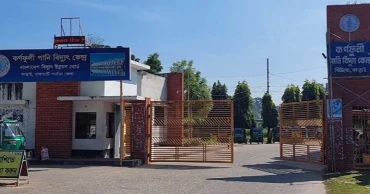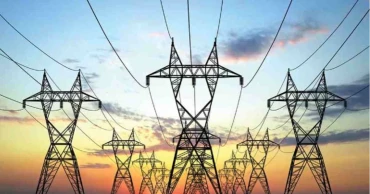power generation
Power generation halted at Barapukuria plant after boiler tube bursts
Power generation at Unit-1 of the Barapukuria Thermal Power Plant in Dinajpur was suspended on Sunday (January 18, 2026) after a boiler tube burst, bringing electricity production at the plant to a complete halt.
As a result, all three units of the plant, with a combined capacity of 525 megawatts (MW), are now out of operation.
Read more: Child killed, 15 injured as bus overturns in Dinajpur
Abu Bakar Siddique, chief engineer of the power plant, said that of the three units, Unit-1, with a capacity of 125 MW, had been generating around 60 MW of electricity at the time of the incident.
“The boiler tube of Unit-1 burst around 11am due to excessive heat pressure. The water flowing inside the boiler has a temperature of around 1,000 degrees Fahrenheit,” he said.
He added that it may take about a week for the boiler to cool down, after which the extent of the damage can be assessed. “If repairs are completed successfully, power generation can be resumed,” he said.
Meanwhile, Unit-3, which has a capacity of 275 MW, has been shut down for overhauling work being carried out by Chinese engineers, while Unit-2 (125 MW) has remained out of operation for a long time due to technical faults.
As a result, the coal-fired power plant is currently completely shut down.
Read more: Big push for renewables: 220 MW Sonagazi solar plant gets green light
Officials warned that the shutdown may lead to load-shedding in northern districts, potentially disrupting production at electricity-dependent industries and causing hardship across the region.
1 month ago
Ghorashal Thermal Power Plant shut for 2.5 months
Power generation at the 1,105-megawatt (MW) Ghorashal Thermal Power Plant in Narsingdi has remained suspended for around two and a half months due to multiple factors, including an ongoing gas crisis, according to its Chief Engineer Enamul Haque.
Citing the prolonged shortage, he said production stopped at three major units this June -- Unit-5 (210 MW) on June 9, Unit-4 (360 MW) on June 13, and Unit-7 (360 MW) on June 14.
The government has diverted gas supply to fertiliser factories, prompting the Ministry of Power, Energy and Mineral Resources to request alternative supply arrangements for power generation.
Enamul Haque said that Units 4, 5 and 7 are mechanically sound and could resume operation immediately once gas becomes available.
Earlier in June, Unit-3 (360 MW) went offline after its turbine rotor blades were damaged. Repair work is now in the final stage and the unit will also resume generation once gas supply is ensured.
Read: Barapukuria Power Plant shuts down due to mechanical issues
Meanwhile, Unit-6 (210 MW) has remained out of operation since June 2010, when a fire destroyed its turbine. Units 1 and 2, commissioned in 1967 and 1976 with 55 MW each, are also non-functional due to recurring mechanical issues.
Authorities plan to dismantle these ageing units and replace them with a new facility.
Once the country’s first large-scale thermal power plant, Ghorashal is now struggling to contribute to the national grid, leaving an impact on daily production.
6 months ago
Bangladesh unlikely to get electricity from Rooppur nuke plant before 2026
Even though most of the agencies concerned are claiming that the Rooppur Nuclear Power Plant (RNPP) is ready to start power generation, experts say that the plant is unlikely to be able to deliver any electricity before 2026.
According to official sources and industry insiders, there is still a long way to go before the RNPP can start commercial operation by the end of 2025.
“There are a lot of issues that still need to be resolved with Russia, including the repayment mode of the Russian loans and the test run of the plant,” a highly placed source told UNB.
The construction of the country’s first nuclear plant, with two units having a total capacity of 2,400 MW of electricity generation, began in November 2017 with a target to commission the first unit in 2024 and the second unit in 2025.
But neither of the units is ready for commissioning due to various unresolved issues related to delivering its output to the national grid.
Bangladesh conceived the idea of establishing the RNPP in 2009 and signed a Memorandum of Understanding with the Russian Federation on May 13, 2009, on the 'Peaceful Uses of Nuclear Energy' and engaged the Russian nuclear power agency Rosatom as the contractor for the plant’s construction.
Alexey Likhachev, Director General of Rosatom, recently visited Dhaka and met Chief Adviser Dr Muhammad Yunus to discuss the project’s progress and shared its unresolved issues, seeking to address them.
He also expressed Russia's commitment to facilitating the successful completion of the project, with a strong focus on safety, quality, and compliance with international standards.
Both sides discussed the merits of revising the Intergovernmental Credit Agreement (IGCA) by extending the credit utilization period until the end of 2026.
Rosatom readies Rooppur NPP unit-1 for 2025 launch
But sources close to Rosatom said that the main focus of its chief was finding a solution to the repayment of the loans by Bangladesh, which has encountered difficulties following the start of the war in Ukraine due to US sanctions on Rosatom.
Sources said that the Russian side proposed that Bangladesh open a branch of one of its state-owned banks so that Rosatom could deposit its money in the Russian bank. “But so far no progress has been made on this issue,” the sources stated.
Regarding the repayment of the Russian loan, which is set to start from 2027 as per the agreement between Dhaka and Moscow, Dr Md Zahedul Hassan, Project Director of the Rooppur Nuclear Power Plant Project, declined to comment on the matter.
He, however, claimed that Unit-1 of the project has achieved 94 percent progress and is now waiting for the power grid to be ready for connection.
“We are now conducting individual tests of the plant's equipment and waiting for the grid line to be ready from Power Grid Bangladesh PLC to begin the test run of Unit-1,” he told UNB.
He also informed that after connecting with the grid line, the RNPP project will need another 4-6 months to begin commercial operations.
Regarding the power grid line, Md Delowar Hossain, Project Director of Power Grid Bangladesh, informed that a total of six grid lines are being contracted by his agency.
“Of these, three lines are ready while the remaining three are under construction. If the RNPP wants to start its first unit, they can do so,” he stated.
However, official sources at the Bangladesh Power Development Board (BPDB) indicated that even if the RNPP and Power Grid Bangladesh complete their works, it will be unlikely to start the commercial operation of Unit-1 until tariff and loan repayment issues are resolved.
Reactor assembly completed at Unit-1 of Rooppur nuke plant
He said that the RNPP authority had yet to complete the calculation of the project's total cost to offer a tariff for selling electricity to the BPDB.
“Almost two years ago, the RNPP authority organized a joint workshop for the BPDB officials to provide an idea about the possible tariff rate. But when they were asked about the project's total cost, including dismantling, they failed to share any information,” he explained.
Regarding the tariff issue, Dr Md Zahedul Hassan, Project Director of RNPP, admitted the matter and said that his organization has been preparing the tariff paper to begin negotiations with the BPDB.
A senior official from the BPDB, however, stated that they have made a preliminary calculation based on data derived from discussions with BAEC and newspaper reports, and the tariff for each unit of electricity from the RNPP will be no less than Tk 10.
From the very beginning, confusion has surrounded its eventual levelized tariff or the possible generation cost of each unit of electricity, said the official.
On January 15, 2013, an agreement regarding a State Export Credit of US$ 500 million was signed for the preparatory phase of the construction works of the Rooppur Nuclear Power Plant.
The Bangladesh government signed a US$ 12.65 billion general contract (GC) in 2015 with the Russian Federation for building the 2,400 MW nuclear power plant at Rooppur. Each unit will generate 1,200 MW of power.
Cold run of diesel generator completed at Rooppur Nuclear Plant’s unit 1
Bangladesh signed a credit agreement with Russia to obtain $11.385 billion in Russian credit for the RNPP in July 2016. This credit will cover 90 percent of the project’s cost.
11 months ago
Power generation from Karnaphuli Power Station rises as Kaptai Lake swells
Karnaphuli Hydroelectric Power Station is generating 203 MW of power per day due to the rise in Kaptai Lake water level.
Heavy rainfall and onrush of water from the upstream has contributed to the rise in the lake's water.
Sources said this is the highest power generation of the power station this year.
Read: First unit of Rooppur Nuclear Plant to be ready for power generation next year, possible tariff rate still not set
Engineer ATM Abduz Zaher, manager of the Karnaphuli Hydroelectric Power Station, said power is being generated from all five units and 203 MW of power was generated till 9:30 am on Monday which is being transmitted to the national grid.
Read: Bangladesh power generation capacity to cross 30,000 MW this year: Official sources
According to the rule curve, Kaptai Lake was initially expected to reach 99.60 feet Mean Sea Level (MSL) but the current the water level has reached 109 feet MSL, indicating the significant impact of the ongoing rains.
If the water level of the Kaptai Lake increases further, then there is a possibility of further rise in power generation, he added.
Read: Water level rises in Kaptai lake after heavy rains; power generation increased
A total of 230 MW of power could be generated from Karnaphuli Hydroelectric Power Station if all five units are operative, said Abduz Zaher.
2 years ago
Record heat driving record power generation, even as loadshedding increases
The country’s power generation increased further, setting a new record on Tuesday with the production reaching 15,626 MW at 9 pm on night.
According to a statement of the Power Division, the country set the new record surpassing the previous production of 15,604 MW at 9 pm on Monday.
Officials at the state-owned Bangladesh Power Development Board (BPDB), said the resting of operation of the diesel-fired and gas fired more power plants attributed to this new record.
They also said import of power from the Adani Power-built thermal power plant for Bangladesh also played a role in this regard.
The country has started importing about 759 MW from Indian Adani Group’s Godda power plant in Jharkhand.
Read more: Power generation rises to 15,304 MW setting new record
They said the cost of the imported power from Adani Group’s power plant at Godda in the Indian state of Jharkhand has not been settled yet, but officials said the tariff of electricity from Adani Group might be above Tk 14 per unit while average production cost is below Tk 7.
Now Bangladesh’s installed grid power generation capacity is over 25,000 MW.
2 years ago
After record, country’s power generation again drops below 15,000 MW
After making a record of crossing 15,300 MW of benchmark, the country’s overall power generation again declined to below 15,000 MW on Saturday.
According to official sources, the sudden shutdown of 660 MW first unit of Rampal Bangladesh-India Moitree power plant attributed to this fall in power generation.
However, no explanation was given by the Bangladesh-India Friendship Power Company Limited (bifpcl) in this regard which owns and operates the plant.
Meanwhile, the country has to experience more than 1000 MW of load shedding due to shortage in power generation.
Bangladesh Power Development Board (BPDB) official record shows that the country generated 13,996 MW on Saturday night against a demand of 15,000 MW.
The BPDB made a forecast for Sunday indicating that the country’ s peak demand would be 16,000 MW on Sunday while maximum generation will be 15,000 MW and there might be a load shedding of about 1000 MW.
BPDB officials said the government withdrew the suspension on power generation by diesel-fired power plants last week following the excessive rise in demand against the backdrop of rise in temperature.
“From last week we have been operating some diesel-fired power plants due to the rise in demand,” a senior official of the BPDB told UNB.
He also said currently about 700 MW diesel-fired power plants have been in the operation.
The government suspended diesel-fired power generation in July last year following soaring fuel price in the international market.
2 years ago
Power generation at Kaptai plant drops severely as rivers dry
The power generation at the hydro power station in Kaptai has been falling due to scarcity of water.
ATM Abduzzaher, managing engineer of Kaptai Hydro Power Station, said only 40 MW power is being produced from the power station due to lack of water as the water receded to 15 feet below from the rule carve.
However, it has the capacity to produce 240 MW power from five generators but only one generator is active now, he said.
If the authorities concerned would be able to operate five generators at a time, then it could be possible to produce 242 MW power but due to water crisis, only the No 2 generator is active, he added.
Also read: Electricity generation disrupted as Kaptai Lake’s water level decreasing
There is no hope to increase the water level as there is no possibility of rainfall activities.
Meanwhile, 5 MW power is being produced from solar panel adjacent to the main dam of the lake and it total only 45 MW power is being generated from the power station which is being added to the national grid.
3 years ago
Govt vigorously promoting renewable energy in power generation mix: Power Secretary
Power secretary Habibur Rahman has said that the government is vigorously promoting renewable energy in the country’s power generation mix.
“In our development endeavour, great importance is given to green energy,” he said while addressing as chief guest at 3-day International Conference on Energy and Power Engineering (ICEPE 2022) on November 24 at Brac Inn in the city.
The Department of Electrical and Electronic Engineering (EEE) of the BRAC University organised the conference with the theme– “Green Energy for All.”
Professor Vincent Chang, Vice Chancellor, BRAC University also joined the opening ceremony as the special guest.
Read more:
The power secretary mentioned that the government is also willing to generate up to 40 percent of electricity from clean energy by 2041.
He suggested the organisers of the conference share the proceedings of the conference with the Power Division, so that the government can take those into consideration while formulating future course of actions.
Professor Vincent Chang, Vice-Chancellor of the university, said that the policy is relevant but any policy without the support of technological advancement will unlikely succeed.
Anything contributing to improvement of energy technology perhaps can be more effective than many policies, he added.
Read more: British High Commission Dhaka turns to renewable energy through solar panels
Professor Md. Mosaddequr Rahman, chairperson of EEE Department and general chair pf the ICEPE 2022 delivered the opening remarks and professor Shahidul Islam Khan, technical chair of the ICEPE 2022 presided over the opening ceremony.
Organized for the second time, ICEPE 2022 aimed at providing a platform to leading researchers, engineers and scientists in the areas of power and energy engineering.
Eminent professors and experts from Bangladesh and abroad conducted panel sessions and keynote talks on power and energy related topics. The conference also called for papers from researchers nationally and internationally.
Professor Saifur Rahman, 2022 IEEE President-elect and Dr. Nagaraja Ramappa, managing director at Power Research & Development Consultants Prv. Ltd, India attended the conference as the keynote speakers.
Read more: Consultant submits final draft on review of renewable energy policy
They spoke on the topics “Causes and Effects of Carbonization on the Climate: Decarbonization Opportunities in the Electric Power Sector” and “Integrated resource planning and power procurement optimization in a RE rich environment” respectively.
Prof. Muhammad Fayyaz Khan, Vice Chancellor, Bangladesh University of Business & Technology, Bangladesh and Dr. Shaikh Fattah (SMIEEE, FIEB), Professor, Department of Electrical and Electronic Engineering and Director, Institute of Robotics and Automation, BUET (IRAB), Bangladesh University of Engineering and Technology (BUET) moderated the panel sessions in this conference.
Professor Tareq Aziz, Ahsanullah University of Science and Technology, Professor Abdul Hasib Chowdhury, Professor, Dept. of EEE & Director, Institute of Nuclear Power Engineering and Mohammad Golam Sarware Kainat Joint Secretary, Posts and Telecommunications Division, Ministry Of Posts, Telecommunications and Information Technology attended as the panelists in the panel session.
The best paper was awarded as the ‘Dr. Fatima-Rashid best paper award’ along with other certifications and prizes on the last day of the conference, said a press release of the Brac University.
3 years ago
Saving electricity: Bangladesh to begin daily one-hour staggered load-shedding from Tuesday
The government has decided to enforce a nationwide daily one-hour of staggered area-based power cuts from Tuesday as the country faces a fuel crunch disrupting power generation.“Primarily, we will conduct daily area-wise one-hour load-shedding on experimental basis. If needed, then after one week we will recast the decision” said State Minister for Power, Energy and Mineral Resources Nasrul Hamid said at a press briefing in the afternoon at his ministry on Monday in a revised announcement.
Hours earlier the load-shedding was announced for two hours a day.
The earlier announcement was made by the Prime Minister’s Energy Adviser Tawfiq-e-Elahi Chowdhury who said the rationing was needed to overcome the power crisis.The adviser announced the decision after a high level meeting at the Prime Minister’s Office Monday morning. Nasrul Hamid and principal Secretary to the Prime Minister Ahmad Kaikaus also attended the meeting.Tawfiq-e-Elahi said the power distribution entities will conduct the load shedding under a schedule so that the people get time to take preparation for it and do not feel any disturbance.But in each spell, no load shedding will continue for more than half an hour, he said.
Also read: 2-hour area-based nationwide load shedding from TuesdayHe said the diesel-run power plants will remain closed until further order to save petroleum fuels while the shopping malls and markets will have to be closed by 8 pm.He said some options like keeping petrol pumps closed one day a week were discussed at the meeting.The adviser said the government office hours may be rescheduled while virtual meetings will be held instead of those with physical presence.Nasrul in his press briefing said no decision was made regarding closing of petrol pump a day in a week.Bangladesh Petroleum Corporation was asked to work out on the issue. They will take final decision after consultation with the transport operators.He also said the religious institutions like mosques, temples and churches were requested to go for taking power saving measures.They should keep operating air conditioners just during the prayer time.
Also read: Countrywide load-shedding increases due to gas shortage in power plantsHe said in no way markets and shopping malls be allowed to keep open after 8 pm.He said closure of diesel-run power plants will save 10 per cent petrol import and another 10 per cent could be saved through conservative consumption of diesel in transport sector. Officials said the country has about 10 diesel-run power plants having 1290 MW, mostly in private sector.
3 years ago
Bangladesh has no deficit in power generation: Nasrul Hamid
Too many trees in rural areas hamper uninterrupted supply of electricity though the country has no deficit in power production, State Minister for Power, Energy and mineral resources Nasrul Hamid told Parliament on Tuesday.
Responding to a tabled question from opposition Jatiya Party lawmaker from Pirojpur Rustam Ali Farazi, the state minister said that the is no deficit of power in country against the demand.
“As a result, there is no load-shedding due to the deficit in power production,” he said.
In response to a question from ruling party lawmake from Chattogram Mahfuzur Rahman, he said that before 2009 the number of people in the country with electricity facilities was 47 per cent.
In the last 13 years, he said, it has been possible to provide electricity to 100 per cent of the people.
The state minister further said that work is underway to bring 100 percent people under electrification under Bangladesh Power Development Board areas.
“It is expected to be completed by June 2023.”
He also said that it was possible to extend cent per cent electrification in all upazilas of the country except some remote areas of Chittagong Hill Tracts.
Responding to a question from Ganoforum lawmaker elected from Sylhet Mokabbir Khan, the state minister said that the government subsidises captive rental or rented power plants every year to provide electricity to the people at affordable prices.
In the financial year 2019-20, Tk 1614 crore and in the financial year 2020-21 Tk 1036 crore has been given.
READ: Specific policy needed to ensure cyber security of power sector: Nasrul Hamid
Replying to a question from ruling party lawmaker elected from Natore Shafiqul Islam Shimul, the state minister said that according to the latest estimates, the total primary gas reserves is 39.9 trillion cubic feet.
The amount of proven and potential reserves to be extracted is 26.42 trillion cubic feet. After the extraction of 19.11 trillion cubic feet of gas from the beginning to last December 2021, the reserves in January 2022 amounted to 9.30 trillion cubic feet, he said.
In response to a question from Mohamamd Ebadul Karim, AL MP from Brahmanbaria, Nasrul said that at present an average of 2,303 million cubic feet of gas is being produced daily from domestic gas fields.
At present, according to the approved gas load of eight consumer classes, the daily demand is 3,600 million cubic feet. Efforts are being made to fill the deficit by importing about 650 million cubic feet of LNG gas daily due to low production from domestic gas fields, he said.
Responding to a question from the ruling party's MP from Dhaka Benazir Ahmed, the state minister said the number of gas wells in the 20 gas fields currently being produced in the country is 107.
The newly discovered Zakiganj gas field has an extractable gas reserve of 53.13 billion cubic feet, he added.
Replying to a question of ruling party MP from Chattogram M Abdul Latif, Industries Minister Nurul Majid Mahmud Humayun said 4,095 metric tonnes of paper produced by Karnafuli Paper Mill remained unsold.
Information and Broadcasting Minister Hasan Mahmud said that a letter was sent to the Department of Posts and Telecommunications to close down the links and cancellation of domain allocation of 179 online news portals that spread confusion among people.
The minister also said the measures were taken as per the instruction of the High Court and on the basis of information provided by the government's intelligence agencies.
In reply to a question from ruling Awami League MP from Chattogram M Abdul Latif, the information minister also said that process is going on to shut down several other online news portals for allegedly spreading false news, rumors and engaging in immoral activities.
The minister said that a letter was sent to the Department of Posts and Telecommunications on October 5, 2021 to close down the links and cancellation of domain allocation of 179 online news portals.
The information minister said the government has already taken various steps to shut down unregistered online news portals.
Replying to another question of AL MP from Dhaka Benazir Ahmed, the minister said that at present there are 1,126 daily, weekly and monthly newspapers publishing from Dhaka district.
Of these, he said, 499 are daily newspapers, 345 are weekly and 262 are monthly.
3 years ago

















